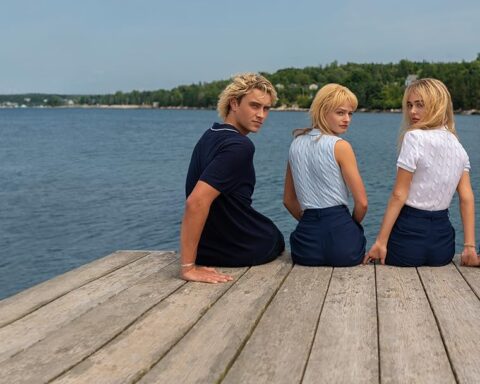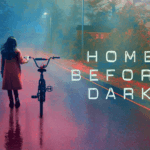Few TV shows capture the ineffable charm of their source material as splendidly as Good Omens. Adapted from the beloved 1990 novel by Neil Gaiman and Terry Pratchett, Good Omens (Amazon Prime & BBC Studios) offers a rare mix of sharp wit, unapologetic weirdness, and enough theological mischief to keep both atheists and believers happily entertained. It’s a tale as old as time: Heaven, Hell, and the middle ground called Earth caught in the middle of an ancient celestial chess game, complete with angels, demons, and one rather bemused anti-Christ.
If Good Omens sounds like your average apocalyptic fare, that’s only because you haven’t met Crowley and Aziraphale yet. This story isn’t here to tell you about the end of the world; it’s here to make you laugh as you watch the end of the world unfold. Let’s dive in and explore why Good Omens is a triumph of wit and whimsy and why you’re bound to fall in love with its mischievous blend of comedy, philosophy, and humanity.

An Angel and Demon Walk into a Bookshop…
At the heart of Good Omens lies a refreshingly unconventional bromance between Aziraphale, a fussy yet kind-hearted angel (Michael Sheen), and Crowley, a jaded but oddly tender-hearted demon (David Tennant). Sheen and Tennant bring these roles to life with an enchanting chemistry that is as unlikely as it is delightful, and the pairing adds a layer of nuance, depth, and British humor to what could easily have been a straightforward celestial sitcom.
Crowley, former snake and current demon, is effortlessly cool. Decked out in an all-black wardrobe and aviators that shield his infernal gaze, he drives a 1926 Bentley with flair. Tennant revels in Crowley’s devil-may-care swagger but laces it with just enough pathos to remind us that he’s a reluctant rebel—rebellious, yes, but hardly eager to see the world burn. He’s too attached to earthly pleasures, including Queen’s Greatest Hits, and even more attached to his unspoken best friend, Aziraphale.
Aziraphale, on the other hand, is the embodiment of divine dorkiness. With his bow tie, prim waistcoats, and his love for antiquarian bookshops, he’s a vision of angelic propriety. But underneath that goody-two-shoes exterior lies a being who has developed a taste for earthly pleasures (like sushi and crepes) and isn’t above bending heavenly rules when necessary. Michael Sheen delivers this celestial conundrum with delightful warmth, adding layers to a character who finds himself paradoxically enjoying his time on Earth—perhaps even more than Heaven itself.
Their shared dilemma? After millennia of “temptations” and “salvations,” Crowley and Aziraphale have grown uncomfortably fond of humanity—and each other. Their unexpected friendship becomes the emotional core of the story, a partnership that defies Heaven’s austerity and Hell’s malevolence alike.

Armageddon, But Make It Absurd
Good Omens thrives on the absurdity of its premise: Aziraphale and Crowley, neither of whom is especially excited about the Apocalypse, team up to prevent it. This sets off a madcap quest as they attempt to locate and “misplace” the Antichrist, a task complicated by the fact that the real Antichrist, an 11-year-old named Adam, has accidentally been raised by a perfectly average family in an idyllic English village.
Gaiman, who adapted the screenplay himself, stays faithful to the novel’s structure while expanding on its world. The story’s humor stems from a sort of cosmic irony: all-powerful beings are hilariously inept when it comes to subtle human interactions, bureaucracy is an even bigger headache in Heaven and Hell, and even an Archangel like Gabriel (played with flamboyant charm by Jon Hamm) has all the finesse of a sledgehammer.
Adam, the unsuspecting young Antichrist, is a winsome blend of innocence and latent power, grappling with the grand metaphysical battle brewing around him. As he and his gang of loyal friends cavort around the countryside, we’re treated to the narrative’s deeper message: innocence often reveals wisdom, and love may be humanity’s best weapon against chaos.

A Feast for the Eyes
Good Omens delights in visual creativity that mirrors its offbeat tone. The sets and costumes are striking, from Crowley’s decadent, plant-filled apartment (which he regularly terrorizes for “insubordination”) to Aziraphale’s cozy bookshop, a bibliophile’s heaven on Earth. Costume designer Claire Anderson captures their personalities through subtle but clever choices: Crowley’s dark, rock-star attire versus Aziraphale’s pastel, almost Edwardian sensibilities.
Director Douglas Mackinnon plays with color and texture to emphasize the contrasts: Heaven is bathed in stark white, minimalist light, while Hell is rendered as an industrial dystopia. These aesthetic choices underscore the absurdity that a divinely ordained world-ending event is in the hands of two beings who, in their own way, don’t belong entirely to either place.
Comedy for the Literary Mind
The humor of Good Omens is its secret weapon. Pratchett and Gaiman’s original novel is an acerbic commentary on bureaucracy, blind obedience, and the folly of cosmic wars fought by those who may not even want to fight them. The show, buoyed by a wry voiceover by God herself (voiced by Frances McDormand), captures this spirit with deft wit.
There are moments of philosophical depth wrapped in comedy, as when Aziraphale muses about the ineffable nature of God’s plan, or Crowley bemoans the cruel randomness of the universe. The show doesn’t shy away from poking fun at theological concepts or casting its heavenly and hellish characters as painfully bureaucratic drones. Gabriel’s brash impatience, Beelzebub’s dispassionate cruelty, and the Four Horsemen of the Apocalypse’s corporate revamp remind us that in the Good Omens universe, divine and diabolical beings are just as flawed as the humans they’re meant to influence.

A Divine Parody of Human Nature
Despite its zany narrative, Good Omens is ultimately a celebration of human nature. Crowley and Aziraphale’s love for humanity—its potential, imperfections, and contradictions—infuses the story with an unexpected warmth. As the angel and demon find themselves questioning their respective roles, they come to understand that neither Heaven nor Hell fully appreciates the messy beauty of the world they’ve come to cherish.
In many ways, Good Omens is a meditation on free will. Aziraphale and Crowley may operate under divine edicts, but it’s their individual choices, their capacity to question, and their strange friendship that ultimately save the day. The show presents a hopeful view of humanity, suggesting that our flaws and failures are perhaps not cosmic accidents but integral parts of a grander design.

A Show for Thinkers, Dreamers, and Devotees of the Absurd
Good Omens is a testament to the strange alchemy that happens when sharp wit meets cosmic questions. It’s a comedy with a philosophical backbone, a romp through Heaven, Hell, and everywhere in between, that dares to ask if an angel and a demon can be friends—and what that might mean for the rest of us.
With its vibrant performances, theological humor, and love for all things absurd, Good Omens is not just a show you watch; it’s a show you experience. If the apocalypse is anything like this, it might be worth sticking around to see what happens next.









